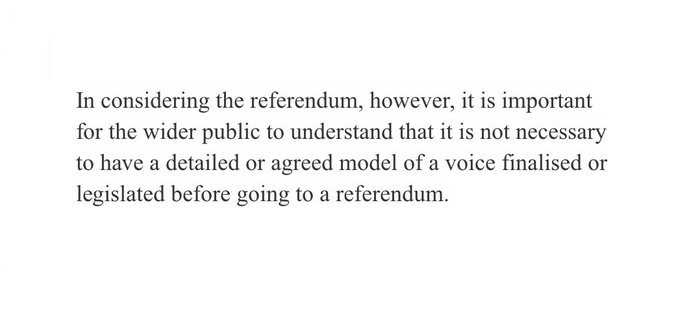was under discussion yesterday. It is a topic I have avoided discussing. To criticise the idea at all is seen by some as "racist" but there are good reasons for concern.
The idea is that a "Voice" would give "First Nation" people the right to be consulted about issues which directly concern them. They actually already have that right but it could be enshrined in law with nothing more than an Act of Parliament. A referendum would only be needed in order to enshrine this in the Constitution.
Is that necessary? There are people who see this as important, very important. It is the "recognition" they crave.
The reality however may be very different. Indigenous people have had ways of being heard for many years. They had the right to vote very early on. In this state all men had the right to vote from 1856 and all women from 1895. It didn't matter whether you were "indigenous" or not. You could vote - and people did.
Among the papers we sorted when my maternal grandfather died was the correspondence with his father, my great-grandfather, about the Sunday sermon he gave to the indigenous people at Point Pearce prior to an election. He was apparently encouraging the men to vote. These people had the means to elect a voice to parliament and they did.
It was not until 1971 that an indigenous Australian was voted in to the Senate but, once there, Senator Bonner did an outstanding job for twenty-one years. What is more he understood the real role of a Senator and did it for everyone in the state he represented, not just along the party-political lines the Senate has become. The Senior Cat once met him at a conference and spoke highly of his grasp of educational affairs. The good Senator saw education as the key to many things.
Perhaps it is education which is needed now, not an extra layer of government. This has been tried in the past. There have been various councils, committees, consultations and more. They have all been designed to "inform" and "advise" government about the needs of indigenous Australians. None of them have worked very well.
There is likely a very good reason for this. The needs of indigenous people are very diverse. Indigenous people in remote communities have very different needs from those in urban communities. People who identify as "indigenous" also vary immensely. I can instantly identify my friend M.... as indigenous. It is much more difficult to identify some others who claim indigenous heritage and claim to speak for indigenous people.
M... is of the view that there is no need for a "Voice". He is of the view he has the right to vote, that others have the right to vote. He once considered nominating for the local council but thought politics, even at that level, was not right for him. We do have indigenous members of parliament at both state and federal level. Indigenous people actually have greater numbers there than women in representative terms. M... thinks indigenous people are doing well. Perhaps they are.
I think I want to know a lot more about this "Voice". It's an important issue, one we need to get right. In order to get a change to the Constitution it will take a majority of people in a majority of the states. It's a big ask. We need to be informed.
That however is not the view of everyone. I was sent this yesterday. It apparently came from an article in our national newspaper three days ago. I will have to go to the library to ready it but it concerns me. People will want to know what they are voting for or it might not be achieved.




No comments:
Post a Comment